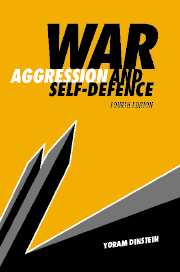Book contents
- Frontmatter
- Contents
- Introduction to the fourth edition
- From the introduction to the first edition
- Table of cases
- Table of treaties
- Table of security council and general assembly resolutions
- List of abbreviations
- Part I The legal nature of war
- Part II The illegality of war
- Part III Exceptions to the prohibition of the use of inter-state force
- Conclusion
- Index of persons
- Index of subject
Introduction to the fourth edition
- Frontmatter
- Contents
- Introduction to the fourth edition
- From the introduction to the first edition
- Table of cases
- Table of treaties
- Table of security council and general assembly resolutions
- List of abbreviations
- Part I The legal nature of war
- Part II The illegality of war
- Part III Exceptions to the prohibition of the use of inter-state force
- Conclusion
- Index of persons
- Index of subject
Summary
This is a completely updated edition of a book originally published in 1988 and last revised in the early part of 2001. In the short space of time since then, the international community has gone through the watershed date of 9 September 2001, the ensuing war in Afghanistan and the resumption of the Gulf War. These events have already left their mark on the way in which the jus ad bellum is perceived and practised. Moreover, several international legal phrases – like ‘material breach’ or so-called ‘preemptive’ self-defence – have percolated from the somewhat rarefied sphere of discourse by scholars and specialists to the public arena of political jousting. The result has been a lot of heat, but not necessarily much light.
The fourth edition examines the new developments in an effort to interpret correctly their proper meaning. As well, the new edition reflects recent judicial pronouncements of the International Court of Justice, relevant decisions adopted by the Security Council, the final Draft Articles on State responsibility as formulated by the International Law Commission and an unprecedented spate of legal literature on the subject of the use of inter-State force.
There are several new supplementary sections in the book. These relate mainly to consent by States to the use of force (as expressed either ad hoc or by treaty); an armed attack by non-State actors; the various phases in the Gulf War up to the occupation of Iraq in 2003 and beyond; and immunities from jurisdiction.
- Type
- Chapter
- Information
- War, Aggression and Self-Defence , pp. xiPublisher: Cambridge University PressPrint publication year: 2005



